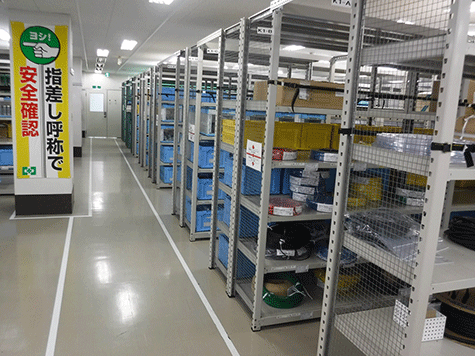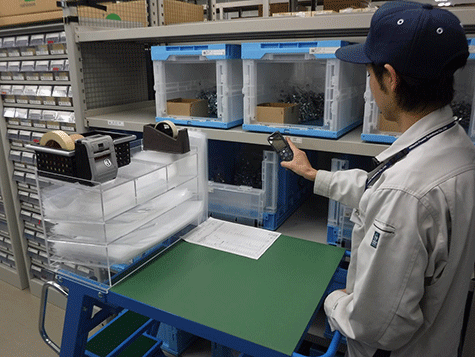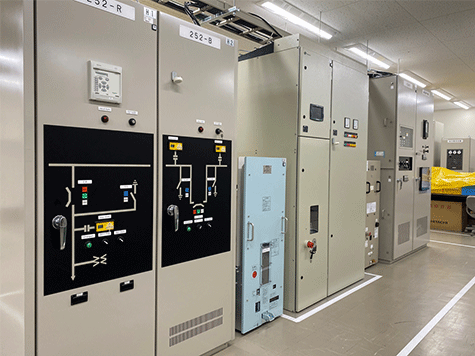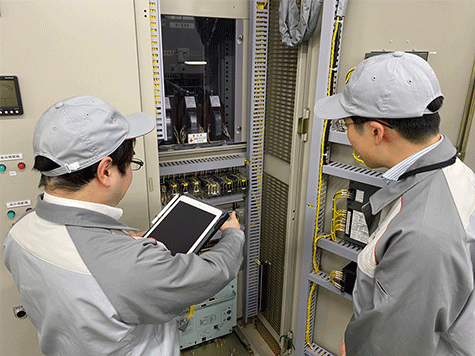We are engaged in both service structures and the development of human resources to improve the quality of our services for substations.
For service structures, we have established a parts center in our Kokubu Office, located in Hitachi, Ibaraki Prefecture. To minimize downtime when trouble occurs, we provide the equipment monitoring services 24 hours a day, 365 days a year at our remote monitoring and support center located in the same city. We have created a system to detect signs of failures and to quickly respond when issues arise. For the development of human resources, we have set up a training school within our Kokubu Office based on the idea that human resources are the most important asset for improving service quality. We are training field engineers to be able to support our maintenance services by concentrating our efforts on acquiring new maintenance skills and passing on many years of abilities.
We steadily store main service parts at the parts center set up in our Kokubu Office. We reduce delivery time and realize quick repairment through the establishment of a system to quickly deliver the necessary parts for regular inspections and recovery responses when trouble arise. Therefore, we can contribute to reduction in customers’ downtime.


We monitor the status of customers' equipment 24 hours a day, 365 days a year at our remote monitoring and support center. When abnormalities occur or when we detect signs of failures, we respond according to contractual details. We also notify customers with an alert when abnormalities occur. The status of the abnormal spot or part can be shared in real time between the center and the customer. We contribute to the reduction in downtime, the quick restoration of faults, and more by investigating the cause and taking action towards resolving it.

Remote Monitoring and Support Center (Hitachi, Ibaraki Prefecture)
At substations, service interruptions or other occurrences that greatly impact society can occur when unexpected situations arise temporarily, and we receive a variety of requests from customers, including for the long-term utilization of deteriorated equipment and for an increase in renewable energy-related facilities. This is why expert skills with an even higher level of precision are required for engineers involved in facility maintenance. We established a training school to offer education and training, aiming to maintain and improve T&D facilities maintenance skills. Initially, this facility was for our own employees, but we have now also established programs where our customers can acquire maintenance skills and knowledge, as well. We support the development of human resources for the maintenance and management of equipment.


Engineers with a wealth of experience give lectures and guidance on everything from the basic content of T&D facilities mechanisms to operations in actual maintenance work. Through actual practice with operations on actual equipment, participants can learn how to handle products.
Participants acquire basic knowledge about electrical circuits and devices in detailed lectures that focus on one of these topics. This course aims to improve skills.
It is important to learn about the basic structure and mechanisms of various related products, in addition to polishing one’s expertise. This course offers a chance to acquire a wider knowledge and various thinking skills through experiencing products outside the participants' area of expertise.
In the last several years, there have been concerns about accidents and damage caused by time-related deterioration that occur during operations when equipment is liable to wear-out failures (after 25 years or more when the failure rate rises). We study response methods for these kinds of accidents and failures based on concrete examples.
There are actually many kinds of accidents and issues due to human errors, from minor close calls to life-threatening major accidents and situations that make the continuance of business difficult. It is important to thoroughly practice basic operations and acquire foundational information to prevent human errors before they occur.